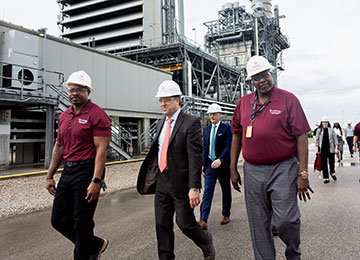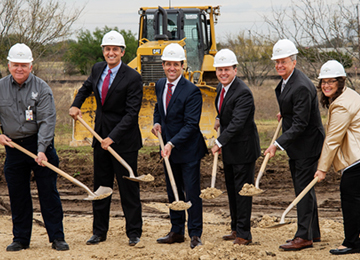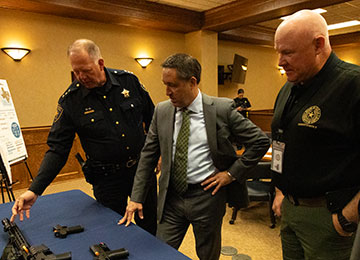From the Desk of Glenn HegarTen years of achievements at the Comptroller’s office
June 2025

I’ve served as Texas Comptroller for 10 years now, and while that is a significant part of my career, it’s a fraction of the 50 years Fiscal Notes has been reporting on the economy. Reaching these dual milestones has naturally led to reflection on the Fiscal Notes legacy, our accomplishments at the agency over the last decade and the work still to be done by my successors.
Since 2015, the team behind Fiscal Notes has published close to 200 articles on the economy, industries and government, along with the work done here at the Comptroller’s office. Those articles, which often reflected my priorities, would prompt and enhance discussions on pressing matters and important legislative work.
In Fiscal Notes’ body of work, two special editions brought public and legislative attention to a prime concern of mine: long-term financial obligations, including health care coverage for public school teachers and employees, infrastructure maintenance and state employee pensions. I worked with the 87th Legislature on efforts to pay down pension debt, launch a new cash balance benefit retirement plan and shore up the deficit in the Texas Guaranteed Tuition Plan. I successfully urged lawmakers to approve a policy for prudent investments in the state’s Economic Stabilization — or Rainy Day — Fund instead of the previous policy that couldn’t keep up with inflation. While the fund is now approaching its cap (a threshold limiting future contributions into the fund), Texas can boast about having sizeable savings to better help us manage our obligations, foretold and unknown.
- The Texas Economic Stabilization Fund | September 2016
- Texas State Government and Long-Term Obligations | March 2017
- Long-Term Obligations and the Texas Legacy Fund | October 2018
- Lawmakers Tackle Long-Term Obligations | September 2021
- Texas’ Rainy Day Fund Projected to Hit Cap for First Time | March 2023

Fiscal Notes also has brought attention to water and energy infrastructure as two of the most important factors that could impact the state’s reputation for economic success. Water, especially, requires significant investments to keep up with demand, as lawmakers recognized again this year. It’s not overstating the matter to say that without a sufficient supply of clean water, Texas will cease to be a beacon of prosperity.
Simultaneously, our analysts and economists have been watching for emerging concerns — notably, housing affordability. This issue has been intensifying for years, and no single solution will fix it, but I’m optimistic to see recent legislation from state officials that will encourage homebuilding and reduce the overall cost of housing. Once again, you can read about this work in Fiscal Notes.
- Texas Water: Planning for More | April 2019
- The 2022 State Water Plan | July 2022
- The Good for Texas Tour: Water Edition | December 2022
- Texas’ Water Demands Could Outpace Supply in Parts of Texas by 2070 | September 2023
- Good for Texas Tour: Energy Edition | February 2024
- The future of Texas power | September 2024
- Texas Housing Prices on the Rise | March 2018
- Housing affordability gap hits Texas | October 2024
While we do our best to plan for crises before they arise, the last 10 years has, at times, seemed particularly unpredictable. As the state navigated multiple once-in-a-generation events, Fiscal Notes writers covered the economics in real time, as well as the developments that unfolded in the months and years after: Hurricane Harvey led to thought-provoking conversations on storm mitigation, and Winter Storm Uri led to major electric reforms with a renewed interest in always-available dispatchable energy. While these natural disasters occurred on historic scales with unique sets of circumstances, Texans are familiar with extreme weather.
A global pandemic and resulting recession followed by unprecedented revenue collections brought challenges of a completely different nature. I and the agency’s fiscal experts met these head-on as we tracked the economy and adjusted our revenue projections. Without missing a beat, the Fiscal Notes team reported on agency-based research and brought together outside insight on the evolving situation.
- A Storm to Remember: Hurricane Harvey and the Texas Economy | February 2018
- Gulf Coast Protection District prepares for future storms | May 2024
- Winter Storm Uri 2021 | October 2021
- Recessions and Revenues | May 2020
- Texas Unemployment Still High | September 2020
- Weathering the Pandemic: Texas Industries and COVID-19 | January 2021
- The Good for Texas Tour: Supply Chains | January 2022
- High-Frequency Data | February 2022
- Inside the State’s Record Revenue | May 2023
The internet and the rise in online shopping represent complex tax issues for our office. Even before the Supreme Court’s decision in South Dakota v. Wayfair permitting states to require remote or out-of-state sellers to collect sales tax on purchases, we had been watching and reporting on the legal landscape in Fiscal Notes. The landmark 2018 decision meant closely working with businesses and the Legislature on policies that would create a level playing field but not be overly burdensome. Fiscal Notes reported the following year that major corporations praised the simple and straightforward legislation.
- Taxing Internet Sales | August 2015
- Taxing Out-of-State Sellers | September 2019
While the Fiscal Notes team has admirably kept up with the changing economic climate, the truth is that relatively few of the agency’s many accomplishments get media attention — seems like when things are running well, it’s generally not considered big news. But I believe we’ve achieved excellent results thanks to hard work and investment in the agency’s people, systems and workplaces.

A point of pride I shared earlier this year is that a record $3 billion has been returned to Texans through the state’s Unclaimed Property program since I took office in 2015. Less known is that record amounts of money have also been reported to the agency by entities holding unclaimed property. Achieving both was the result of addressing the system behind the program. We rearranged personnel and hired more to work specifically on the issues we knew were causing difficulties. A switch from regional in-person to industry-specific webinars has resulted in hundreds more businesses now aware of their holder reporting responsibilities. Further improvements were made through embracing intra-agency cooperation. Without a talented Information Technology Division, Unclaimed Property (and other programs) would still be operating on a “green screen” rather than a modern, web-based application.
That’s not the only technological enhancement implemented at the agency during my tenure. One of my first major undertakings was rebuilding our public-facing website, Comptroller.Texas.Gov. The award-winning endeavor consolidated more than 400,000 webpages to emphasize the quality of information over quantity. Then, we enhanced search functionality and accessibility to ensure everyone could access our helpful tools and information.
Making sure taxpayers could get to our online filing tools was only part of the fix. While Texas has benefited from a growing number of taxpayers, it was straining our old Webfile system on peak tax filing days, causing delays and frustration for our customers. Following a long period of hard work and updates, we have a new Webfile system that can keep up with demand and incrementally expand its capacity as processing needs increase over time. Further, several manual and paper processes have been automated, making many areas — including open records requests, property tax arbitration and local government programs — more efficient and better focused on our customers: the taxpayers of Texas.
When it comes to technology, a top priority is ensuring our computer systems and the data contained within are secure. By modernizing agency security systems, we now have a true identity management solution with multifactor authentication, automated vulnerability management and comprehensive risk assessments.

Our numerous accomplishments as an agency have resulted in more responsibilities through legislatively mandated programs that support individuals, communities and businesses across the state.
In 2015, we were tasked with establishing the Texas Bullion Depository, the nation's first state-administered precious metals depository. Since opening in 2018, the value of metals deposited has increased an unbelievable 4,413 percent, with a 254 percent increase since 2020.
Also, within the last five years, we moved operations to a purpose-built facility 30 miles north of Austin. I have to think the increase in metals on deposit is due to customers’ confidence in the state oversight of the program as well as the security features, including a highest-rated Class III vault and a security perimeter not ordinarily available to depositories located near large metropolitan areas.

That’s not the only new program we now manage. The Texas Opioid Abatement Fund Council oversees allocation of funding available through legal claims against companies involved in the opioid epidemic and ensures funds are spent to remediate the crisis using effective methods.
The Rural Law Enforcement Grants Program provides financial resources to eligible counties so they can help ensure their communities’ safety. I lead the Organized Retail Theft Task Force, focused on the impact of organized retail crime in the state.

And through our Educational Opportunities and Investment Division, we maintain the Texas ABLE Program, established to help individuals with disabilities and their families save money for expenses critical to maintaining independence. Also making an impact is the Broadband Development Office, which works to secure reliable, high-speed internet for all Texans — a necessity for accessing school, work, health care and more.
- Texas ABLE® Turns Two | April 2020
- The Texas Bullion Depository | August 2021
- Texas Communities Sound Off on Broadband Access | April 2022
- Texas Opioid Abatement Fund Council | January 2023
- Fighting a Fossil Fuels Boycott | May 2023
- Enhancing rural law enforcement in Texas | April 2024
As required by the Legislature, it’s our responsibility to maintain divestment statute lists, including lists of companies found to boycott energy companies or Israel. Texas prides itself on supporting businesses, but when we see actions by certain companies are hurting some groups, it’s important we take a stand. Of course we can still be fair. My goal has always been to engage in a more transparent and honest conversation. I believe these efforts have led to real progress as financial institutions rethink the practices that diminished returns for investors and undermined a key industry in our economy.
As always, I’m proud of the staff taking all of this on — I appreciate their professionalism, consideration and accuracy, and their innovation when called to develop a new program (often with little precedent to guide them) or to improve on programs the Comptroller’s office has been running for decades. Enough credit can’t be given to the many dependable employees who make our work happen and allow me to focus on leading the agency while they keep it running. Don’t be fooled — keeping up with this level of responsibility requires a lot of dedicated people with a vast depth and range of knowledge.

During my tenure, I addressed periods of exceptionally high turnover in the state’s government workforce. While a normal part of any industry, losing too much knowledge hurts our ability to serve taxpayers, so we sought to improve the employee experience from day one. Providing an encouraging workplace with the resources to help individuals grow in their positions helps us maintain highly trained, knowledgeable staff who will excel at the agency.
We achieved this by investing in our Professional Development team, improving learning opportunities and adding a dedicated employee training room. We looked at the entire employee journey, starting with reimagining New Employee Orientation as an interactive experience and establishing the Comptroller’s Leadership Institute — a unique, six-month training program that prepares leaders for the highest levels of agency management.
- State Employees: Turnover Rises in Hot Economy | May 2018
- Comptroller Analyzes State Workforce Challenges | July 2023
To address the day-to-day experience, we’ve added more employee groups, including an advisory board, book club and Toastmasters. These groups help our staff connect across divisions, increase morale, share new ideas and offer improvements. Several groups host hybrid meetings, ensuring interested employees in field offices also can participate. And, with legislative support, we addressed the condition of our headquarters and field offices to ensure we are providing a safe and inviting environment for employees and guests.
Along the way, the agency was recognized as a top workplace by the Austin American-Statesman, proving that investing in people always pays off. Our eighth-place rank among public and private companies with more than 500 employees was a result of concerted effort, which has translated to a more effective and efficient agency for Texans.

Ten years ago, I stepped into the Comptroller’s role with a lot of ideas. Not all have materialized, but one overarching goal that I think has been accomplished was to leave the agency better than I found it. That’s no criticism of my predecessors — our work is never done. There is always room for improvement and always a need for maintenance.
Fiscal Notes is an excellent example of this. To keep up with trends, the publication evolved under my tenure from its origins as a four-page printed financial statement into today’s online multimedia presentation of the state’s economy, with many iterations along the way. Few could have dreamed of the internet when this publication launched in 1975! Likewise, future Comptrollers will certainly have visions for the agency that I never could have imagined.
I am proud to have served Texans as their Comptroller and honored to have worked among this group of committed civil servants.


